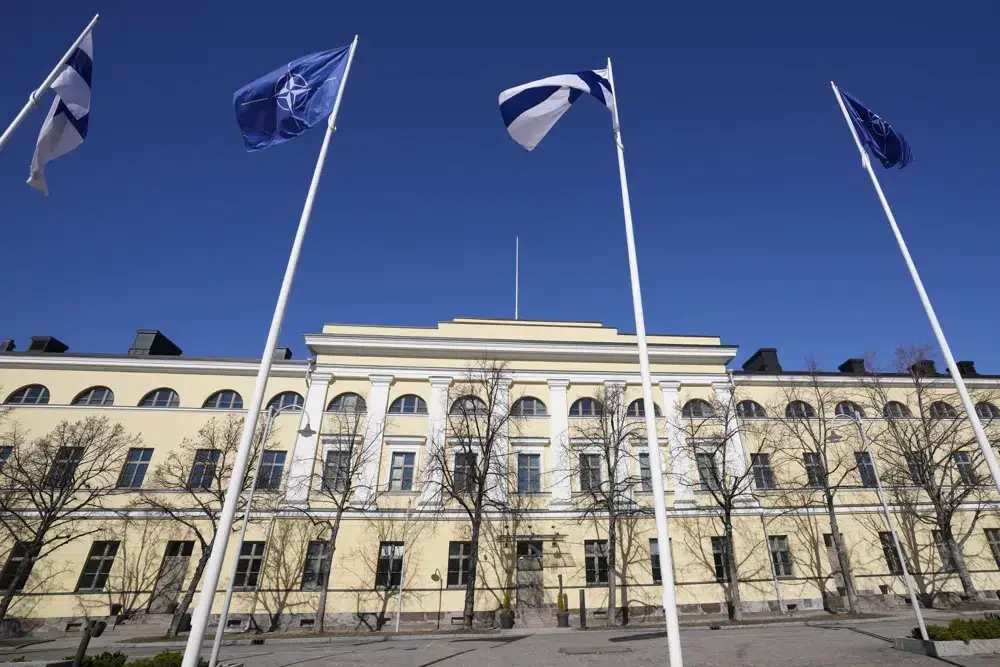
The selling points of the charming bed-and-breakfast are its century-old buildings, its spacious rooms and its proximity to Russia, a short cross-country ski trip to the east.
For Russians, it was place to stay when they came to buy dairy goods and dish soap in the closest part of the European Union, which became a part of NATO on Tuesday. For Finns with roots in the Karelia region, which covers parts of both Finland and Russia, they could go across the border to buy cheap gas and car parts and visit sites of the clashes between Finnish forces and the Soviet Red Army during World War II.
The harmony of the Kuuksenkaari bed-and-breakfast was briefly interrupted Tuesday morning when owners Eija Hiltunen and Eero Tuomisto argued, peacefully and quietly, about the necessity of Finland joining NATO, the Finnish flag lifted alongside 30 others in Brussels.
For Eija Hiltunen, who moved to the northern Karelia region with her husband more than a decade ago, Finland becoming part of the world’s biggest security alliance was an unnecessary provocation.
“For the past fifteen, twenty years now, things have been quiet here on the border. It has been easy to cross the border and there has been plenty of cross-border activity,” said Hiltunen.
Her husband, a retired business journalist from Helsinki, was a stronger supporter of their country joining NATO.
“I think it feels somewhat safer now,” said Tuomisto, whose grandfather fought against the Soviet Red Army in clashes in the region during World War II. “There is no uncertainty anymore. The previous crisis (World War II) isn’t that far behind us. You can see it all around here. Noone has forgotten our history with Russia.”
Their area, Ilomantsi, in the easternmost trip of the EU, has several museums dedicated to war memorabilia and battles that Finns fought against the Soviet Union.
Finland shares a 1,340-kilometer (832-mile) border with Russia, so its entry will more than double the size of NATO’s border with Russia. Though the alliance says it poses no threat to Moscow, the Russian Foreign Ministry warned that “it will be forced to take military-technical and other retaliatory measures” to a move that marks “a fundamental change in the situation in Northern Europe, which had previously been one of the most stable regions in the world.”
Kremlin spokesman Dmitry Peskov also pointed out Tuesday that Russia has no territorial disputes with Finland.
In Finland, Hiltunen pointed out that their area's distance from the capital, about 485 kilometers (300 miles) away, has affected their feelings about joining NATO.
“I would be awfully happy about NATO membership if I lived in Helsinki,” said Hiltunen who moved to Ilomantsi from the capital 14 years ago. “But when you live here on the eastern border between NATO and Russia ... it makes you think and brings different kind of thoughts and feelings to your mind.”
The NATO flags were raised alongside the national flags in front of the Ministry of Foreign Affairs, a building that was originally built for the military of the Russian Empire in the 19th century. Curious onlookers could be seen near the gates of the foreign ministry.
Aki Luhtanen, a professor of psychiatric nursing who was among those stopping by the Foreign Ministry, said Russia’s war on Ukraine feels very close and NATO membership offers protection now, and for the long term.
“I think we should be aware and afraid of Russia,” Luhtanen said. “And I think in the future (it) is very, very important to belong to NATO.”
It was on that same ministry building that Finnish authorities projected the colors of the Ukrainian flag after Russia’s invasion last year, in an early sign of strong support for Kiev.
Newspapers, leaders and commentators alike agreed that Tuesday was a historic day for the Nordic nation of 5.5 million people.
“Until now, we have defended our country alone,” Defense Minister Antti Kaikkonen told public broadcaster YLE on arrival in Brussels. “From now on, we can rely on getting outside help should things get tough. And of course, we are ready to help should someone be in trouble.”
The ceremony in Brussels falls on the 74th anniversary of the signing of NATO's founding Washington Treaty on April 4, 1949.
Finland’s parliamentary website was briefly paralyzed by a denial-of-service attack on Tuesday. The attacks — in which participants flood targets with junk data — made the parliament’s site hard to use, with many pages not loading and some functions not available. It was seen by cyber experts as a way to grab attention.
A pro-Russian hacker group known as NoName057 (16) claimed responsibility, saying the attack was retaliation for Finland joining NATO. The hacker group has taken part in a slew of cyberattacks on the U.S. and its allies in the past. Its claim could not be immediately verified.
The personal webpage of Prime Minister Sanna Marin was also briefly down due to a denial-of-service attack, the Finnish news agency STT said.